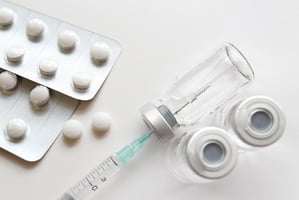Naltrexone-Bupropion Combination May Help People With Methamphetamine Use Disorder

A combination of naltrexone plus bupropion can reduce methamphetamine use in people with moderate to severe methamphetamine use disorder, reports a study in the New England Journal of Medicine. In a randomized clinical trial of over 400 adults, 13.6% of participants who took extended-release naltrexone/bupropion significantly reduced or stopped their methamphetamine use compared with 2.5% of those who took placebo.
“Methamphetamine use disorder is a serious illness and is associated with medical conditions and mental health issues, marked functional impairment, and frequent relapses,” wrote Madhukar Trivedi, M.D., of the University of Texas Southwestern Medical Center in Dallas and colleagues. “There is no medication approved by the Food and Drug Administration for the treatment of methamphetamine use disorder, and effective treatment has been identified as an essential public health goal.”
Trivedi and colleagues enrolled 403 adults aged 18 to 65 who met the DSM-5 criteria for moderate or severe stimulant use disorder (methamphetamine type) and reported using methamphetamine on at least 18 of the 30 previous days. Adults were excluded from the trial if they were undergoing concurrent treatment for substance use disorder, were taking opioids, and/or expected a need for opioid medications during the trial (for example, for a planned surgery). The participants were then assigned to receive either 380 mg of injectable naltrexone every three weeks combined with 450 mg oral bupropion once daily or matching placebo injections and pills.
The trial was divided into two six-week stages. In the first stage, 109 participants were given naltrexone/bupropion, and 294 were given placebo. After six weeks, the 225 participants in the placebo group who remained in the trial after showing no response to placebo were randomly assigned to one of two groups: 114 received naltrexone/bupropion, and 111 continued to take placebo. Medication response was defined as having at least three out of four urine samples provided during the last two weeks of each study stage test negative for methamphetamine.
After the first stage, 16.5% of participants in the naltrexone/bupropion group and 3.4% in the placebo group had a response. In the second stage, 11.4% of participants in the naltrexone/bupropion group and 1.8% in the placebo group had a response. Participants taking naltrexone/bupropion also reported lower drug cravings than those taking placebo.
Most of the participants in either group reported at least one adverse event during the trial, but most of these events were mild to moderate in severity. Adverse events that were more common in people taking naltrexone/bupropion included nausea, vomiting, tremors, malaise, and loss of appetite.
To read more on this topic, see the Psychiatric News article “Why Aren’t There More Medications for Substance Use Disorders?”
(Image: iStock/Minerva Studio)
APA’s Next Town Hall to Examine How Racism Affects Diversity in Psychiatric Workforce
Register now for the town hall “Structural Racism & Psychiatric Residency Training: Recruitment, Retention, and Development,” to be held Monday, February 8, at 8 p.m. ET. Panelists will address the disproportionate number of minority psychiatrists, their experiences in different practice settings, and why having diversity in the psychiatric workforce psychiatry is important for everyone.





